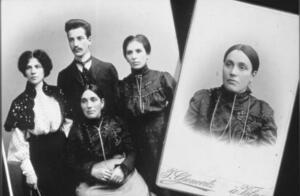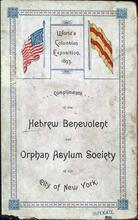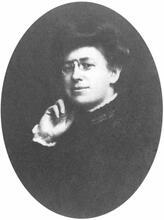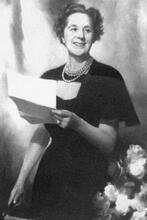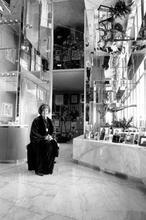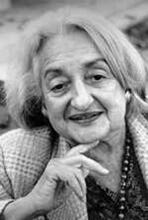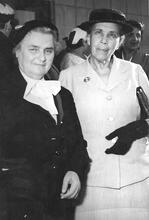Taube Kaplan
Taube Kaplan, the Greene Rebitzin, was a Montreal-based philanthropist and women’s health advocate who raised funds for the Hebrew Maternity Ward and Jewish General Hospital. After witnessing the state of maternal and infant healthcare, Kaplan ran a door-to-door collection campaign to raise $7000 to open a clinic on Cadieux Street (rue du Bullion). The Hebrew Maternity Ward treated hundreds of patients from its opening in 1916 until its closing in 1929. Kaplan also raised funds for the establishment of Jewish General Hospital, located in the Côte-des-Neiges neighborhood of Montreal. Although she was instrumental in the establishment of these organizations, Kaplan declined memorialization and led a private life until her death on August 11, 1940.
Taube Kaplan, known by her community as the Greene Rebitzin (rabbi’s wife), spearheaded the fundraising campaigns to establish several healthcare facilities to support early twentieth-century Montreal’s growing Jewish community. Her extraordinary philanthropic efforts contrasted with her otherwise modest life as a Hebrew and religion teacher.
Early Life and Immigration to Canada
Born in Vilnius, Lithuania, in 1855, Kaplan spent the first several decades of her life living among the Jews in the Pale of Settlement. A rebbetzin and a mother, Kaplan and her husband, Rabbi Jacob Kaplan, immigrated in 1906 to Montreal, Quebec, where she continued to teach Hebrew and religion classes to support herself and her husband. Like many Jewish immigrants to Canada, the Kaplans were impoverished and required two incomes to afford their basic needs. Their arrival coincided with a time of both increased immigration from Eastern Europe and increasing antisemitism in Montreal.
While their new city was majority Catholic, the couple settled in the predominantly working-class Jewish neighborhood of St. Louis, part of the Plateau-Mont Royal borough, and faced many of the same struggles as their neighbors. The neighborhood was majority Yiddish-speaking, which alienated it from Quebec’s established Anglo-Jewish community.
Montreal’s Jewish community held a unique position in North American Jewry. Not only was Quebec a majority Catholic province within a largely Protestant Canadian society, but Montreal also had an east-west linguistic divide, with the eastern half of the city speaking French and the western half predominantly speaking English. The city’s Jewish residents mainly resided on “The Main” (St. Laurent Street), located between the French and English-speaking neighborhoods. In the first decade of the twentieth century, Quebec’s judicial system attempted to incorporate new Jewish immigrants into the strict religiously based social fabric of the province, resulting in the Jewish community being excluded from the French-speaking Catholic public services and legally classified as a “Protestant” community. The classification led the community to attempt to set up its own social services, which largely isolated them from the other parts of the city.
The Kaplans lived on Cadieux Street (now rue du Bullion), an underserved neighborhood predominantly populated by garment workers. It was here that Taube Kaplan witnessed the shortcomings of Montreal’s healthcare system and their devastating effects on her community. Until this point, hospitals and clinics in Montreal were operated by Christian organizations and were not prepared to care for the growing yet impoverished Jewish community. Jewish patients faced language barriers, prejudice from the medical staff, and a lack of kosher food, while expectant mothers were not able to receive prenatal or postpartum care. Institutional antisemitism also prevented Jewish doctors and nurses from obtaining employment in Montreal’s Christian healthcare facilities. These barriers contributed to high mortality rates, inspiring Kaplan to fundraise for the establishment of health clinics and hospitals to cater to the Jewish community.
Fundraising Efforts
Within a few years of her arrival in Montreal, Kaplan was one of the principal fundraisers for the first Jewish medical clinic in Montreal. For the first six months of 1912, she and several other women led door-to-door fundraising campaigns for the clinic’s establishment. The Herzl Dispensary and Hospital opened its doors in July 1912 and was the first subsidized healthcare facility in Canada, offering no-cost preventative and curative services for the underserved Yiddish-speaking population. The center also employed Jewish medical staff. Its goal was to assist new immigrants, many of whom arrived in Montreal with acute and chronic illnesses. The clinic opened with two beds, but the staff quickly realized they were insufficient to meet the needs of the families they served. First in 1916 and then again in 1936, the clinic moved to larger buildings to accommodate the rapidly growing immigrant community, both Jewish and non-Jewish. In 1966, Canada’s Medical Care Act, which established a nationalized healthcare system, presented challenges for the Herzl Dispensary. Quebec’s healthcare subsidies excluded religiously affiliated healthcare facilities, placing undue financial strain on the Dispensary, as patients were able to access free health services through the provincial health clinics. Lacking the proper funding from the province, the Herzl Dispensary merged with Jewish General in 1974.
After the opening of the Herzl Dispensary, Kaplan’s focus shifted to improving healthcare for expectant mothers and infants, ultimately leading her to found the Hebrew Maternity Ward. In 1901, Montreal’s infant mortality rate was the second highest in the world, with one in four infants dying before their first birthday, due to failures of pre-natal and postpartum care and the lack of infrastructure to assist with fatal labor complications. Ultimately, these factors resulted from cramped urban conditions and the structural failures of Montreal’s healthcare system. Kaplan restarted her door-to-door campaign and raised $7000 to purchase a house on Cadieux Street, founding the Hebrew Maternity Ward in November 1916. The Maternity Ward faced many of the same challenges as the Herzl Dispensary, as the staff quickly realized that the fourteen-bed ward was ill-equipped to serve their community. The staff of Hebrew Maternity Ward oversaw hundreds of births prior to the establishment of Jewish General Hospital in 1934, while providing pre- and postpartum care to impoverished mothers.
As the Jewish community continued to grow, the Hebrew Maternity Ward and the Herzl Dispensary found themselves ill-equipped to handle their patients’ demands, which led Kaplan to continue fundraising. Throughout the 1920s, she continued her door-to-door campaigns for the Maternity Ward and the Herzl Dispensary, and in 1929 she contributed several thousand dollars to found the Jewish General Hospital in Côte-des-Neiges.
Legacy
Kaplan’s role as principal fundraiser was instrumental to the to the increasingly self-sufficient Yiddish speaking community in Montreal. Through her door-to-door fundraising and small personal contributions, Kaplan’s commitment to the Jewish community’s well-being continues to positively impact Jewish and non-Jewish Montrealers. In 1938, Kaplan retired to the Montreal Hebrew Old People’s Sheltering Home, where she resided until her death on August 11, 1940.
Despite the impact Kaplan had on her community, she led a private life and requested that her likeness not be used in the facilities she founded and refused a position on Jewish General’s Board of Directors. After the completion of Jewish General Hospital, Allen Bronfman, Canadian-Jewish philanthropist, proposed a ward be named for her, but Kaplan refused and suggested the ward be named after Palestine’s High Commissioner, Sir Herbert Samuel. Her efforts changed the social fabric of Montreal’s Jewish community through her commitment to matan beseyser (giving to charity in secret). Little has been written about Kaplan’s personal life and her financial contributions are known largely through Arthur Hart’s 1926 book, The Jew in Canada, which highlights her support for these institutions. Her legacy is known primarily through the institutions for which she fundraised and that she founded.
Kaplan’s grassroots fundraising techniques were instrumental to the to the increasingly self-sufficient Yiddish-speaking community in Montreal. Her founding of the Hebrew Maternity Ward not only alleviated the strain on new mothers, but also assisted in combatting antisemitism in Montreal’s healthcare system during a time of heightened institutional and interpersonal bigotry towards the Jewish community. Her title, the Greene Rebitzin, stemmed not only from her husband’s career as a rabbi but also from her personal relationships with the staff at the Herzl Dispensary and Hospital and the Hebrew Maternity Ward. Kaplan’s work helped to create a self-sustaining healthcare system, decades before the introduction of the Canadian Medicare system of nationalized health care.
Guttman, Frank Myron, and Alexander Wright. The Sir Mortimer B. Davis Jewish General Hospital. Montreal: McGill-Queen’s University Press, 2018.
Hart, Arthur Daniel. The Jew in Canada. Toronto: Now & Then Books, 2010 (first published in 1926).
Joseph, Norma. “Jewish Women in Canada: An Evolving Role.” In From Immigration to Integration: The Canadian Jewish Experience: A Millennium Edition, edited by Ruth Klein and Frank Dimant. Toronto, Ont: Institute for International Affairs, B’nai Brith Canada, 2001.
King, Joe. Les juifs de Montréal: trois siècles de parcours exceptionnels. Outremont, Québec: Carte blanche, 2002.
Landau-Chark, Susan. “The Montreal Rebbetzin: Portraits in Time.” Canadian Jewish Studies / Études Juives Canadiennes, 2008.
Levine, Allan. Seeking the Fabled City: The Canadian Jewish Experience. Toronto: McClelland & Stewart, 2018.
Statistics Canada. “1911 Census of Canada.” Microfilm: T-20437, 1911. RG31, Statistics Canada. Library and Archives Canada.
Tremblay, Janie. “Hôpital Général Juif | Hebrew Maternity Centennial.” JGH Historical Archives- Exhibits and Digitized Works, November 11, 2022.


